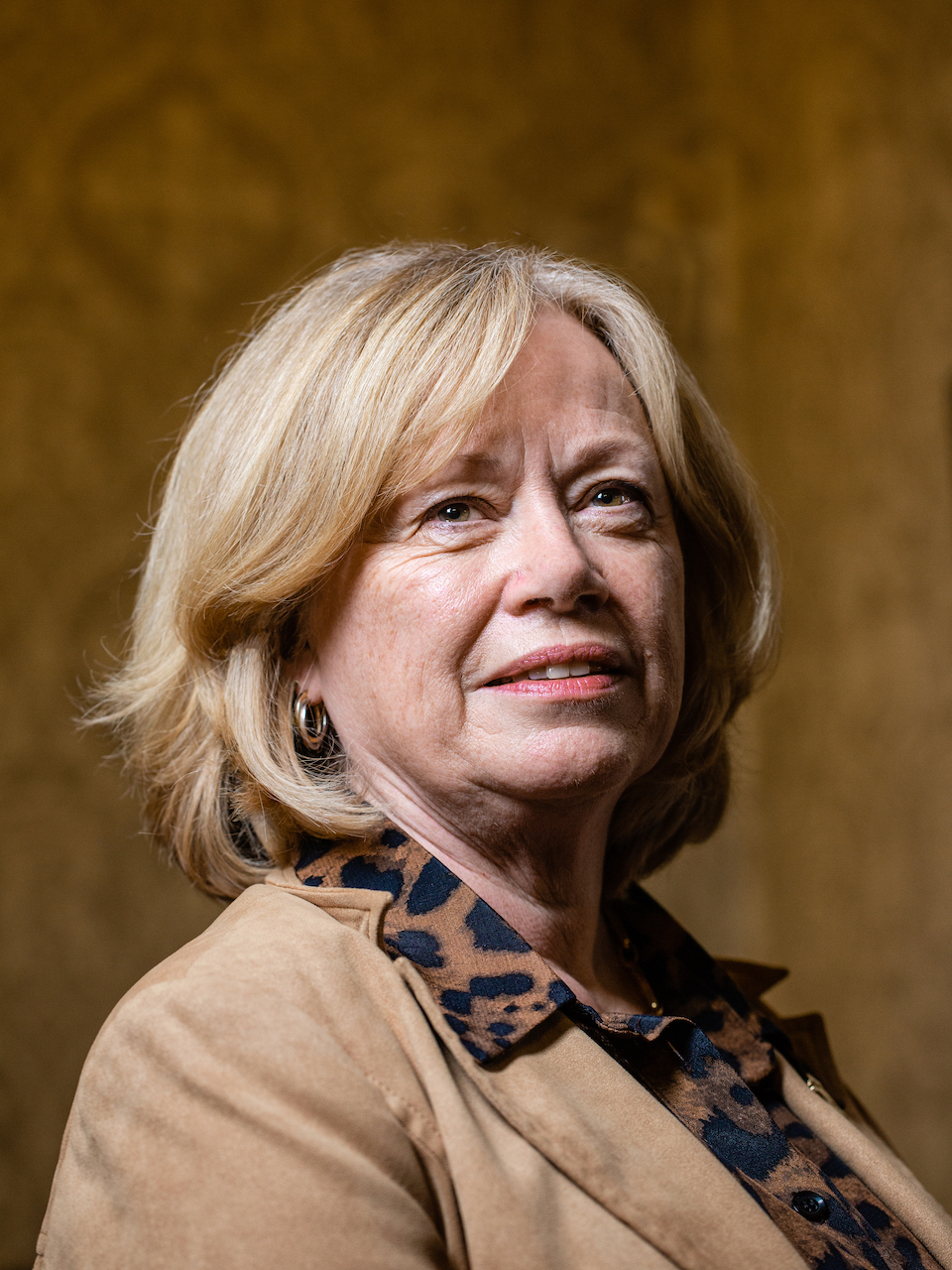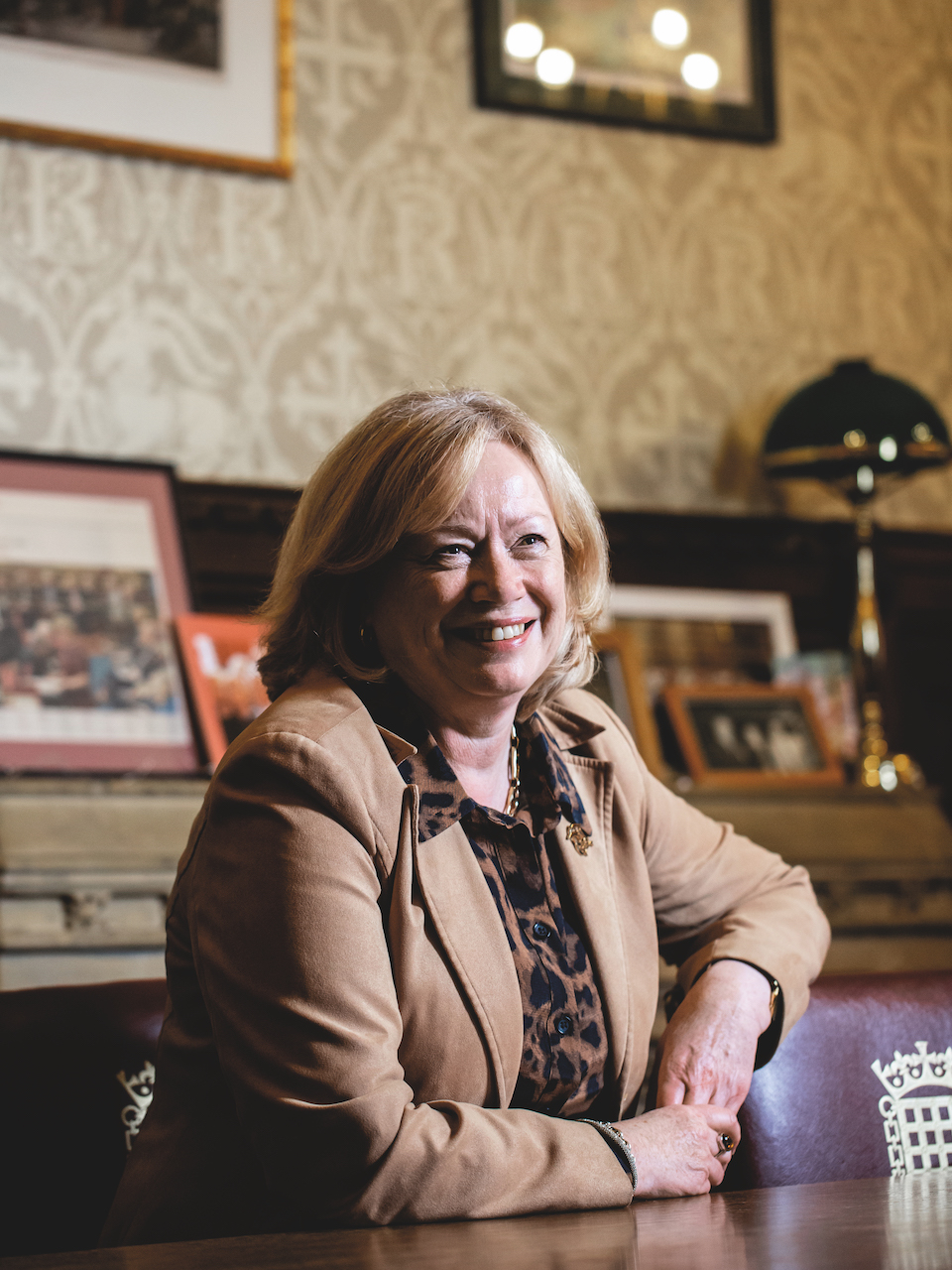Baroness Smith: 'We should be honest about what we can achieve on Lords reform'
Angela Smith, Baroness Smith of Basildon, Leader of the Opposition in the Lords. (Photography by Louise Haywood-Schiefer)
10 min read
Would Labour really abolish the House of Lords? Sienna Rodgers talks to Baroness Smith about her party’s constitutional plans in government and her 35-year career in politics
The House of Lords comprises almost 100 more Conservative peers than Labour ones. If the polls are right and Keir Starmer’s party is within touching distance of executive power, one key question the leadership must consider is how to get its legislative programme through Parliament. Will Starmer, who has committed to abolishing the Upper Chamber in its current form, rush through the appointment of a huge number of new members as soon as he takes office? Not “Tony’s cronies” but “Keir’s peers”?
Labour’s leader in the Lords, Angela Smith, rules out that course of action. “No. Ain’t gonna happen,” she tells The House with utter certainty. “The idea that Keir Starmer is on day one going to have a list of 100 people to put here is cloud cuckoo.” How, then, does she expect to ensure Labour can pass its legislation? “If you look at the numbers at the moment, the Tories have over 100 more than us, and they still lose votes,” she points out.
“If I’m leader of the House, I don’t want this to be a numbers game, like ‘yah boo, we’ve got more than you, we’re gonna win, we’re gonna smash this through’. That’s not what the House of Lords does.”
“There’ll be something about House of Lords reform in the manifesto. It is most times. But I think we should be honest about what we can achieve and what we’re ready to do”
Baroness Smith does admit, however, that Labour will need to “refresh our numbers” in the Lords. After all, her group is the oldest in the House; it hasn’t had new peers join at the same speed as the Conservatives. (After 13 years of New Labour, there were only two dozen more Labour peers than Conservatives, Smith notes.) How many appointments would this refresh involve? “I haven’t got a number for you, but I just know that’s not where Keir is headed, quite rightly. That’s not where he’d want to be at all.”
The leader of the opposition in the Lords has now been a member of the Upper Chamber for 13 years – longer than she was in the Commons, where she represented Basildon from 1997 to 2010. How did she feel when first walking into Parliament as an MP? “Absolutely terrified,” she says. “I thought somebody will think I’m an impostor, and they’ll come and drag me out.”
Yet she had already worked around Westminster for some time: first in her job with the League Against Cruel Sports, which saw her lobbying MPs; then as an MP’s researcher. “I’m poacher turned gamekeeper turned quarry in many ways.”
Her first few years as an MP were spent on the back benches. Once, when Conservative MPs were filibustering the Minimum Wage Bill, Smith and colleagues started in the morning and kept at it until 8pm, then had a light meal and some water. She proudly recalls what remains the longest ever committee session on record: “They thought we were going to stop at 10pm. We didn’t, we carried on – we went through to 1pm the next day.”
Even more impressively, on the second day she was simultaneously on another committee in the next room, making her a time traveller of sorts. “In the minimum wage committee, it was still Tuesday,” she explains, “but in the other room it was Wednesday. I think I’m the only person to have voted at the same time in two committees on different days!”
When Smith entered the Lords in 2010, just two months after losing her Commons seat, she was under the impression it was going to be an easier ride. “I came in here thinking ‘well, it’ll be a bit less pressured’. I’d been Northern Ireland minister for three and a half years, I’d been Gordon’s PPS [parliamentary private secretary] at No 10, done a huge range of jobs at the other end. I remember Nigel, my husband, saying to me, ‘It won’t be quite as demanding in the Lords for you. It will be a little easier.’ No chance!”
Half of the Labour group leader’s time in her role, which she took in 2015, has been spent serving under Jeremy Corbyn. The left-wing rebel turned chief did not find his biggest fan in Smith, whose election to the shadow cabinet meant she had her own mandate and could not easily be removed.
Recalling the days of Corbyn, she says: “There were difficult times. Not everybody in the shadow cabinet was bad, there were some really good people in that shadow cabinet, across the political divide in many ways. But there wasn’t that sense from everybody that you are pulling together to achieve something special.”
And under Starmer? “It’s far more focused and professional now. It’s got a real sense of business being done. I come out of shadow cabinet meetings feeling encouraged, thinking ‘yes, we’re getting ready here, this is serious’.”
 Baroness Smith (Photography by Louise Haywood-Schiefer)
Baroness Smith (Photography by Louise Haywood-Schiefer)
“I like working with Keir,” she says. “He’s not somebody who is going to wear his emotional heart on his sleeve, but he thinks about things deeply… It’s difficult sometimes to be impressed by people who become friends, but when you regard them as friends and you’re impressed, you know you’re in the right place.”
Nigel Farage recently used his appearance on reality TV show I’m A Celebrity… to disparage the House of Lords, telling campmates that a legislator friend of his calls it “the best retirement home in the country” and that, being stuffed with party donors, it is “corrupt”. Does Smith worry about the chamber having such a poor reputation?
“Of course, because it’s so unfair,” she says, before conceding: “I’m not saying there aren’t people who think that, for whatever reason, they don’t have to work when they’re here.” But she adds that many who do not treat their Lords membership as a full-time job nonetheless make valuable contributions. “To characterise all members in that way, [Farage] knows it’s wrong. He knows it’s unfair. He probably knows he won’t get a seat in here anyway.”
Farage may have been motivated by a cynical determination to get more airtime, but his comments bring us to an important subject: Lords reform. In a constitutional review commissioned by Labour and completed last year, former prime minister Gordon Brown described the current House of Lords as “indefensible” and recommended it be replaced by a fully elected chamber. Starmer agreed and promised to abolish it; already, however, that pledge has been weakened and is no longer a first-term commitment.
“If you’ve got two elected houses, do you say the elections to one House have a greater validity than the elections to the other House, to preserve House of Commons primacy? Or do you say we’ll have different roles? How do you work it out? It’s fair to say that work wasn’t done in the Brown report,” Smith says.
“If I’m honest, I think the first few years of a Labour government will be dealing with economic growth and the cost of living… There’ll be something about House of Lords reform in the manifesto. It is most times. But I think we should be honest about what we can achieve and what we’re ready to do.”
She continues: “What’s the form of election? What’s the constituency? What’s the constituency role? It’s quite hard to find people who would say, ‘come and vote for me, because I want to advise the House of Commons’, which is what we do at the moment.”
 Baroness Smith (Photography by Louise Haywood-Schiefer)
Baroness Smith (Photography by Louise Haywood-Schiefer)
Smith, like other peers, evidently has unanswered questions around the practicalities of a wholly elected Upper Chamber. She emphasises that there is significant appetite for reform, however: “This is the first time in the history of Parliament that the House of Lords has wanted reform and it’s the government that has stopped it.”
The Labour Lords leader would like to see a well-thought-out package of reforms that address the size of the House (currently unlimited, making it the second largest legislative chamber in the world) and the appointments process (often accused of lacking transparency and rigour).
“We’ve had appointments in recent years where a few eyebrows have been raised,” she says. “I’m thinking, what on earth are they doing here? I’ve had Conservative members say to me, ‘This is awful, why are we putting in people who are never going to turn up?’”
In beefing up the powers of the House of Lords Appointment Commission, which vets nominations for life peers but can be ignored by the Prime Minister, she would also favour post-appointment assessment, looking at what contributions existing members have made.
One aspect of the Lords that should be up for the chop in her view: hereditary peer by-elections. The New Labour compromise made in 1999, still in place today, means only 92 hereditary peers can take their seats but they are continually refreshed via votes held among the existing pool. These by-elections are “a nonsense”, Smith says. “We’re all terribly embarrassed by them. It’s like if you watch Blackadder with the elections in Dunny-on-the-Wold. It just feels excruciating.”
“The Tory leader has a phrase he uses to me: what goes around comes around. It absolutely does”
Looking ahead to the next general election, we turn to Labour’s offer to the country. Critics say its core message – asking voters “are you better off under the Tories?” – is too negative. “I’m more comfortable with what we’ve got to offer now than I’ve been for a long time,” Smith says. “It felt a bit thin a year ago, but we’ve had to put flesh on the bones ourselves. I think that’s really emerging now and you’re seeing the detail.”
Has she been involved in talks about the first 100 days of a Labour government? Smith is quick to shut down the question, cheerfully but firmly: “Am I going to share with you everything we’ve been talking about?” Well, then, is she preparing for her probable next role as leader of the Lords? “I’ve been preparing for it from the day I became the leader of the Labour group,” she replies.
Her plans are optimistic, based on karmic belief. “We could have been a really irresponsible opposition and just said to the government, ‘we’ll vote down everything, no I don’t like what you’re doing’ and vote it down. We don’t because that’s not the way the Lords behaves. And I expect the same in return,” she explains.
The opposition Lords leader issues a stark warning to the Conservatives, who may soon be finding out how it feels for the shoe to be on the other foot. “The Tory leader has a phrase he uses to me: what goes around comes around. It absolutely does,” she says with a smile.
Smith is coming up to 35 years as an elected representative in politics, including 26 years in Parliament – and she is still on the frontline, with no intention of stepping back. How has she not burnt out? “You should see the picture in the attic,” she laughs. “I’ve always thought: when I stop enjoying it, that’s the time to go.” And she is still enjoying it? “Yes. I’m not saying every day is absolute bliss, but there’s nothing else I’d rather do.”
